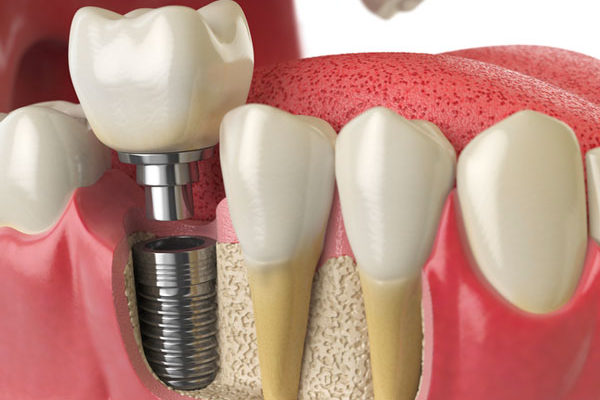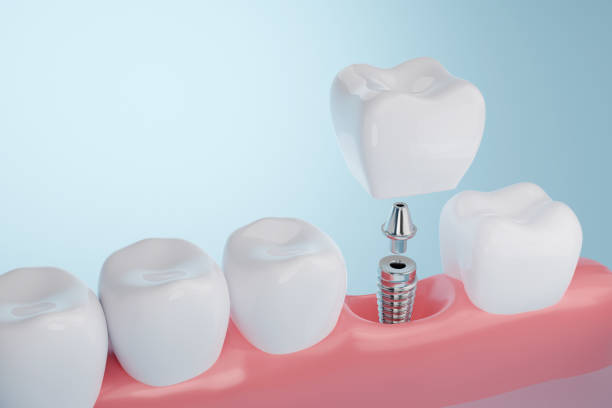
Dental implants: what are the
advantages and disadvantages?
Dental implants have become a common solution for replacing missing teeth. These medical devices, which act like artificial roots, offer several advantages over other dental restoration options.
However, they also come with certain disadvantages that patients need to be aware of before making a decision. This article explores the positives and negatives of dental implants in depth to provide a comprehensive view on the subject.
What is a dental implant?
A dental implant is an artificial root made of metal, usually titanium, that is inserted into the jawbone to support a crown, bridge or removable denture. It's a modern solution for replacing lost teeth and restoring smiles and oral functionality.
The installation process
There are several stages in the installation of a dental implant:
- Consultation and planning: The dentist assesses the condition of the jaw and gums to determine whether the patient is suitable for an implant.
- Surgery: The implant is inserted into the jawbone under local or general anaesthetic.
- Healing period: It takes several months for the implant to integrate with the bone (osseointegration).
- Fixing the prosthesis: Once healing is complete, the dental crown or prosthesis is mounted on the implant.
Advantages of dental implants
Sustainable solution
Unlike other solutions such as bridges or removable dentures, implants can last a lifetime with proper care. They are made from robust materials such as titanium, which resist corrosion and daily chewing forces.
Improved aesthetics
Implants are designed to look and function like natural teeth.
This feature not only improves the appearance of the smile, but also boosts self-confidence. They also avoid the problems of slippage or noise often associated with removable prostheses.
Bone preservation
Implants protect against bone loss in the jaw, a common phenomenon when a tooth is missing. The artificial root stimulates the bone in a natural way, helping to maintain its density and volume.
Enhanced functionality
With implants, patients regain almost 100% of their masticatory capacity, enabling them to eat a wide variety of foods comfortably. Implants do not interfere with speech, nor do they cause the difficulties usually encountered with less stable devices.
Disadvantages of dental implants
Long processing times
The whole process can take several months due to the various phases involved, including the healing period required for osseointegration. For patients in a hurry, this can be a significant inconvenience.
Surgical procedure
Installation requires surgery, which always entails risks such as infection, nerve damage and other complications. Rigorous medical monitoring is essential to prevent these risks.
Not for everyone
Some patients do not have the right medical conditions to receive implants. For example, those with severe bone disease, uncontrolled diabetes or heavy smoking habits may be excluded.
Mechanical failure
Although rare, mechanical failures can occur. These include implant rupture or crown loosening. In such cases, additional surgery may be required to repair or replace the damaged implant.

Comparison with other dental replacement solutions
Removable prostheses
Removable prostheses, such as dentures, are a less expensive but less stable alternative to implants. They require specific daily maintenance and can cause gum irritation. They also have a shorter lifespan, and often need to be adjusted or refurbished.
Dental bridges
Dental bridges are attached to adjacent teeth and can offer an effective solution without the need for surgery. However, unlike implants, they do not prevent bone loss and sometimes require compromising the structure of the teeth supporting the bridge.
Materials used for dental implants
Titanium
Titanium is the most commonly used material, thanks to its biocompatible properties and ability to integrate perfectly with bone. Its use considerably reduces the risk of rejection or infection.
Zirconia
For patients allergic to titanium or preferring a metal-free option, zirconia implants represent a viable alternative. Although less common, they offer excellent esthetic results with a color close to natural teeth.
Factors influencing the success of dental implants
Oral health
Good oral health and rigorous hygiene practices are crucial to implant success. Regular brushing, flossing and visits to the dentist help keep the implant in excellent condition.
Bone quality
The density and quality of the jawbone play an essential role. In the case of insufficient bone, a bone graft may be required prior to implantation, further extending the time and cost of treatment.
Precise intervention
The experience and skills of the dental surgeon also affect success rates. Accurate diagnosis and careful planning are essential to ensure the best possible result.
Lifestyle habits
Factors such as smoking and excessive alcohol consumption can compromise osseointegration and increase the risk of failure. Patients are often encouraged to adopt a healthy lifestyle to maximize the chances of success.
Dental implants at the Centre Dentaire Chêne-Bourg
If you've lost one or more teeth, you know how this can affect your daily life, from difficulty chewing to cosmetic discomfort. Fortunately, dental implants offer a durable and aesthetic solution for restoring your smile.
Don't let tooth loss affect your daily life any longer.
Contact Centre Dentaire Chêne-Bourg today to schedule a consultation and find out how dental implants can improve your quality of life.
Discover also the Centre Dentaire Lancy and the Centre Dentaire Champel





